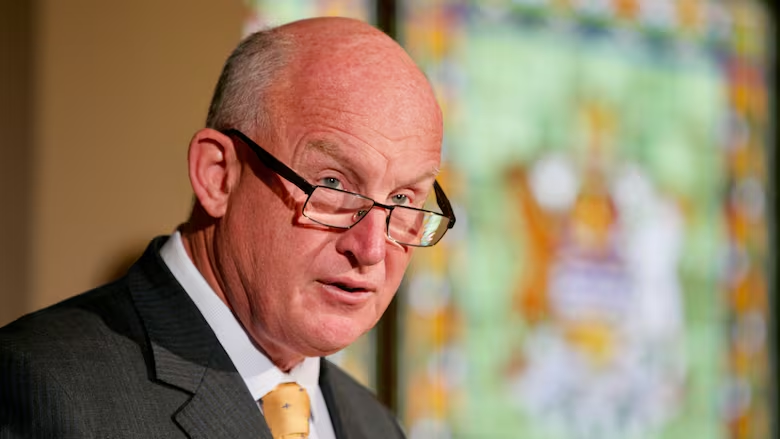RCMP can now set up checkpoints on B.C. highway corridors to deter non-essential travel: minister
Province banned non-essential travel last week

The RCMP will set up road checks on highways connecting B.C.'s regional zones in a bid to enforce the ban on non-essential travel, the province's solicitor general said Friday.
Mike Farnworth, who is also the public safety minister, said police will conduct periodic road checks at key travel points and that violators could be fined $575.
Farnworth last week banned non-essential travel between the province's three regional zones until May 25.
He said at a Friday news conference the RCMP can now set up road checks on highway corridors connecting the zones — but not within the zones, in downtown Vancouver, for example.
Farnworth said police can ask the driver for the reason for their travel, along with their name, address, licence and secondary identification if they have recently moved. Documentation proving the reason for travel will not be required, and vehicle passengers will not be asked for documentation.
Police will ask drivers to turn around
Farnworth said police will not be collecting personal information.
If police determine that a driver is travelling outside their zone for a non-essential reason, they will be directed to turn around and leave the area.
Farnworth said there will be signs warning drivers of upcoming check stops, which will allow them to turn around if they feel their travel is not essential.
"Spreading this message will continue to be more important than ticketing," said Farnworth, adding that the restrictions brought in a week ago have begun to have an impact — and that the message is to stay in your local community.
"We will continue to drive home the message that just because you are in your health authority, it doesn't mean that you go from Abbotsford to Whistler."
The RCMP is in the process of deciding where the checkpoints will be, but they will be limited to Highways 1, 3, 5 and 99 near regional boundaries, according to B.C. RCMP Chief Supt. Dave Attfield.
"These checks will be conducted by a dedicated team and will not reduce police service in the communities which we serve. All police personnel and partner agencies taking part in the checks will be following COVID-19 protocols to ensure the safety of everyone," Attfield said in a statement Friday.
He said he anticipates that most drivers will comply voluntarily, limiting the need for actual enforcement.
Alberta border, ferry checks
Farnworth said there will not be check stops on the border with Alberta, where COVID-19 case counts are currently surging.
The province will continue to manage the provincial border with signs warning travellers they should not be entering B.C.
There will also not be check stops around BC Ferries terminals. Farnworth said BC Ferries staff will continue to ask passengers for their reason for travelling, and enforcement will be handled by RCMP and municipal police forces.

The highway check stops will be run by a dedicated unit of the RCMP's E-division.
The National Police Federation previously criticized the order, saying it lacks clarity and that its RCMP members in B.C. are at risk of public backlash and exposure to the coronavirus due to a slow immunization rollout for officers.
On Friday, the federation issued a statement in reaction to Farnworth's news conference, saying "we are pleased to see that this order address many of our concerns and is significantly reduced from the minister's initial enforcement-centred proposal, and is focused on information and encouraging people not to travel between regions.
"We will continue to work with the RCMP on its implementation and to addressing member concerns."
Concerns raised about expanded police powers
The B.C. Civil Liberties Association has said Indigenous, Black and racialized communities could be at risk of negative harmful impacts when dealing with police.
Farnworth has maintained the province sought input from racialized communities but, when asked on Friday, did not provide specifics of which groups he consulted with.
"We have been listening to these concerns," he said.
"There will be no street checks. These orders apply to the enforcement at the site where checks are set up. While restrictions are in place, we will listen to feedback to get it right."
The government is using provincial health authority regions to define the boundaries of the regional zones that people are not supposed to cross for non-essential reasons.
The three regional zones are:
- The Lower Mainland and Fraser Valley (Vancouver Coastal Health and Fraser Health areas).
- Vancouver Island (Island Health).
- Northern and Interior regions (Northern health and Interior Health).
Farnworth also said the province has expanded the list of essential travel reasons, including people avoiding abuse or violence, and adding to the list of those who can visit long-term care homes.
Other reasons for travel deemed essential include:
- Attending school or work.
- Transporting commercial goods.
- Returning to a principal residence.
- Accessing child care.
- Using health care or assisting someone in obtaining health care.
With files from The Canadian Press